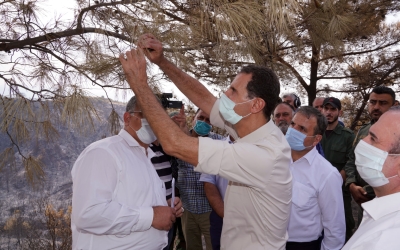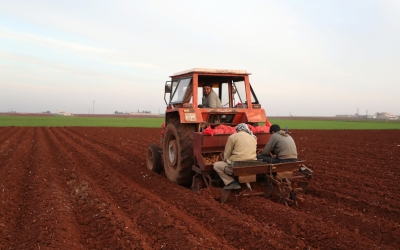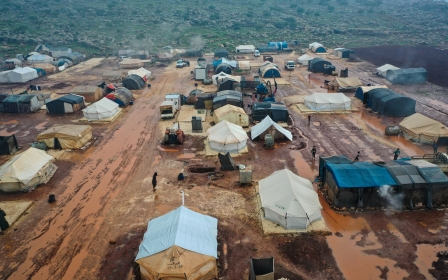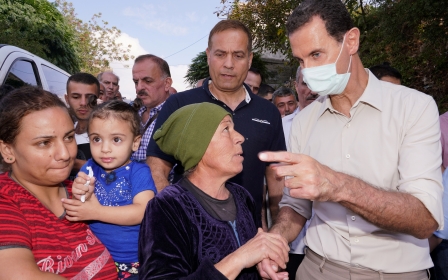Damascus threatens to seize property from displaced Syrians over conscription fees
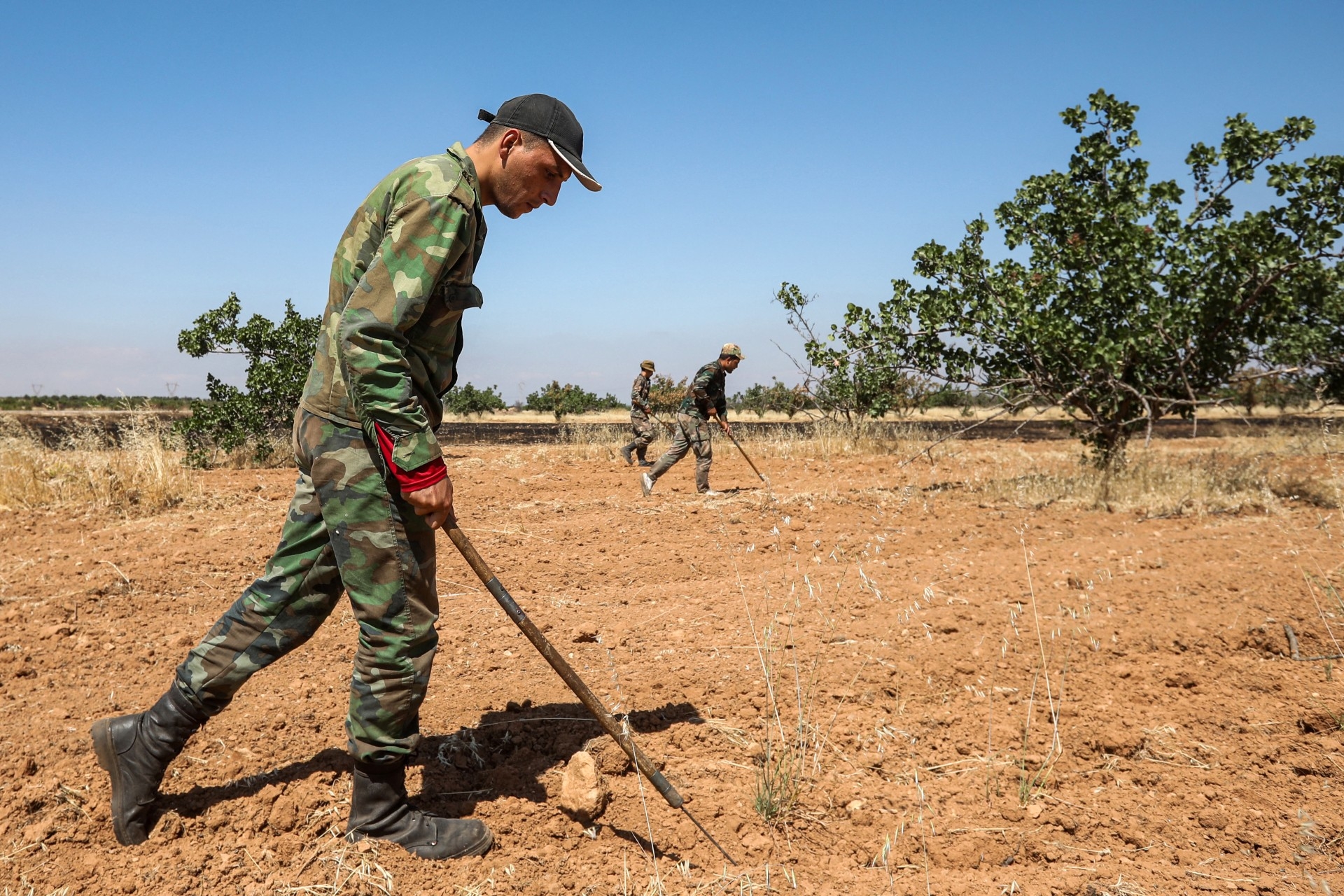
The Syrian government intends to seize property and assets of Syrian refugees and internally displaced people who fail to pay exorbitant fees - already one of the administration's biggest sources of income - in exchange for military service exemptions.
Brigadier General Elias Bitar, head of the army’s Exemptions and Reserves Branch, made the announcement last week in a 15-minute interview conducted by the Syrian Ministry of Information and published on its official Facebook page and by pro-government media.
New MEE newsletter: Jerusalem Dispatch
Sign up to get the latest insights and analysis on Israel-Palestine, alongside Turkey Unpacked and other MEE newsletters
In addition to threatening their properties, the government has offered money transfer facilities to urge civilians to pay at a time when the state’s need for currency has increased due to an economic collapse caused by the decade-long war and western sanctions.
"The military judiciary will prepare notification notes to seize money and property from citizens over 43-years old who have not paid the exemption fee," Bitar said.
The amendments of article 97 of Syria’s Military Conscription Law allow the immediate confiscation of assets, without previous notice, for Syrian men who did not pay the required $8,000 exemption fee releasing them of the obligation to perform the mandatory military service within a period of three months from the day they turned 43, the age limit for conscription.
"The president has issued decrees that facilitate payment processes to include wider segments [of the population]," said Bitar, seen with a picture of Syrian President Bashar al-Assad behind him.
"There are strict laws that no citizen can evade, the state can seize his property and money, the money of his parents, wife, relatives and anyone related to him.”
Unfair decisions
Human Rights Watch (HRW) condemned the move, saying that the laws were a way of retaliating against political opponents and civilians who had fled the country.
“The government legislates unfair laws to obtain money in any way, even if it is through confiscation of civilian property,” Sara Kayyali, a Syrian researcher at HRW, told Middle East Eye.
“The majority of refugees in Lebanon and, to a lesser extent, Turkey and Jordan, are unable to obtain residence papers and therefore cannot work, and pay [the fees].
'The government legislates unfair laws to obtain money in any way, even if it is through confiscation of civilian property'
- Sara Kayyali, HRW
"Even those who work, the amount is beyond their capacity. The economic situation of refugees despite humanitarian support is very poor.”
Bitar laid out the payment process that Syrians can use, including through a legal agent or relatives inside Syria or returning to the country to make the transaction.
“Even those who have obtained citizenship abroad must pay the exemption fee of $8,000, in addition to $200 for each year of delay,” he said.
The law allows refugees to pay in euros and dollars through Syrian embassies, after paying $50 to settle their situation with the security services, if they have left the country legally before 2020.
The cost of the transaction through Syrian embassies, in addition to extracting the required documents, ranges from $175 to $350.
Lucrative law
Late last year, Assad’s government introduced amendments to the Military Service Law requiring Syrians to pay fees according to the number of years they have resided abroad, releasing them from military service obligations.
Syrians who spend one year, two years, three years or four years abroad can pay $10,000, $9,000, $8,000 or $7,000 respectively to acquire exemptions.
Those who serve in fixed positions in the military can now pay $3,000 or its equivalent in local currency in exchange for exemption.
The exchange rate of the dollar on the Syrian black market is around 3,400 Syrian pounds, but the Central Bank of Syria has set the exchange rate at 1,256 pounds and imposed strict control on the parallel market.
However, the central bank itself is asking those who pay the exemption fee to pay at a rate close to the one on the black market. The bank said on Tuesday that the exchange rate for those payments is 2,525 pounds.
These actions earn the state's treasury double the funds, making the military exemption fees one of the most important sources of income for the Syrian government.
Documents published by the Syrian foreign ministry list more than 3,200 names granted exemptions in exchange for the $8,000 fee, which earned the government $25.8m in the first half of 2020 alone.
Other documents show the personal information of around 4,800 Syrians who have been required to pay between $25 and $200 in fines linked to late payments of fees or for fees related to the postponement of performing the military service.
Complicated problems
The Syrian defence and foreign ministries did not respond to MEE inquiries earlier last year about the controversial payment laws and about why refugees are forced to pay more than they can afford.
The US Caesar Act - named after the Syrian photographer who leaked photos of thousands of people killed by Syria's intelligence service - has strained the resources of the government, which has not ceased its attacks on civilian areas in rebel-held enclaves.
The attacks by the Syrian army, supported by Iran and Russia, have led to thousands of civilians fleeing the country out of fear for their lives and to avoid joining the army through mandatory conscriptions.
But after years of asylum, they now find themselves forced to pay that same army to avoid losing their property, money, and the money of their relatives still inside the country.
Some opposition activists are urging Syrians not to give the government the funds it demands.
'There are no actual solutions. The government's procedures to seize refugee property are numerous, some of which are for unknown reasons'
- Syrian refugee
“Anyone who pays exemption fees should be tried on charges of financing Assad,” Fahd al-Mousa, a member of the Free Syria Lawyers Association based in northern Syria, told MEE.
Mousa called on refugees to be patient as they await a political solution that would restore their property.
"For those in Assad-controlled areas, the law will not forgive them if they engage in abuses with Assad's forces," he said.
“The International Human Rights Court issued a decision to secure the right to asylum for every soldier who wishes to defect from Assad's forces before he becomes involved in war crimes.”
But it's not so easy for the millions of displaced Syrians, who have lost so much already.
"There are no actual solutions. The government's procedures to seize refugee property are numerous, some of which are for unknown reasons," a Syrian refugee living in France told MEE.
"We will start selling our properties and move my father and the rest of my family out of the country," added the refugee, who refused to be named for security reasons.
Obeda al-Fadil, a refugee living in Germany, said government forces have taken control of his family's farms east of Idlib province, without any given reason.
"The military solutions failed and led to the destruction of the cities. We now hope that political solutions will succeed," he said.
Middle East Eye delivers independent and unrivalled coverage and analysis of the Middle East, North Africa and beyond. To learn more about republishing this content and the associated fees, please fill out this form. More about MEE can be found here.


